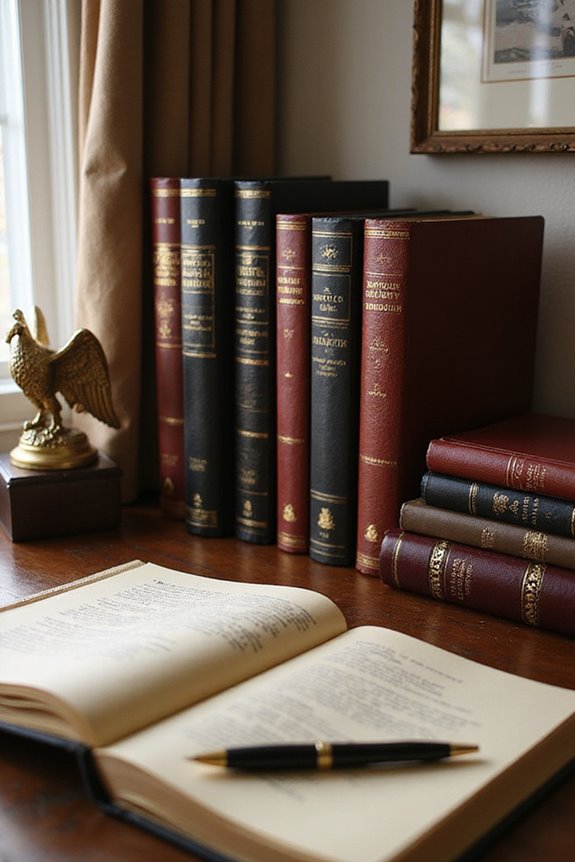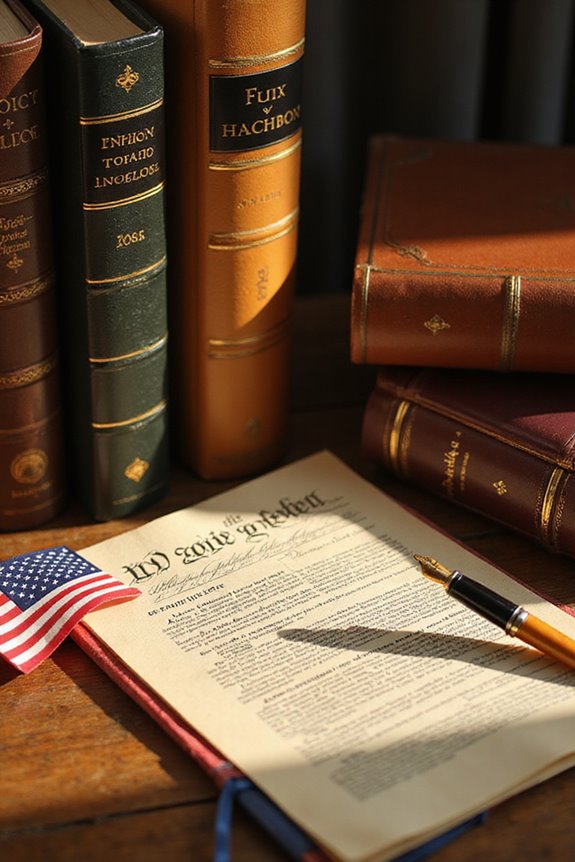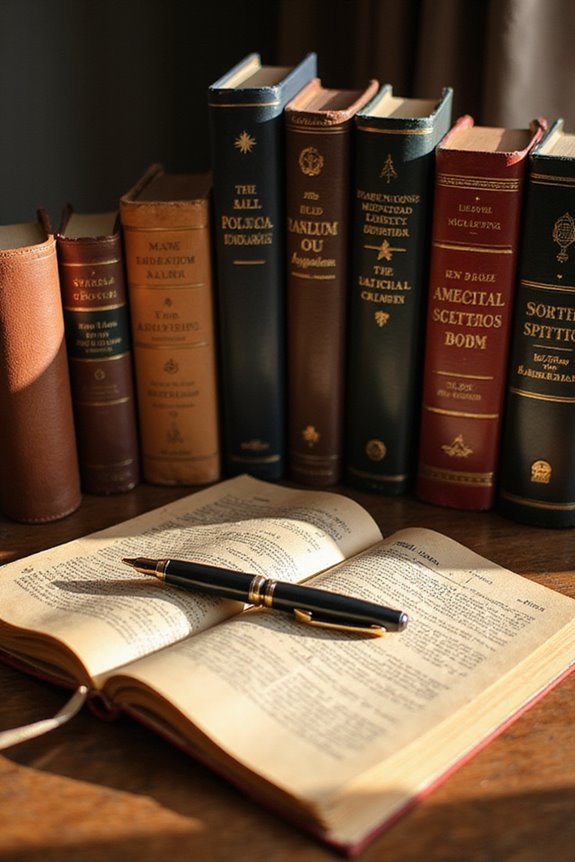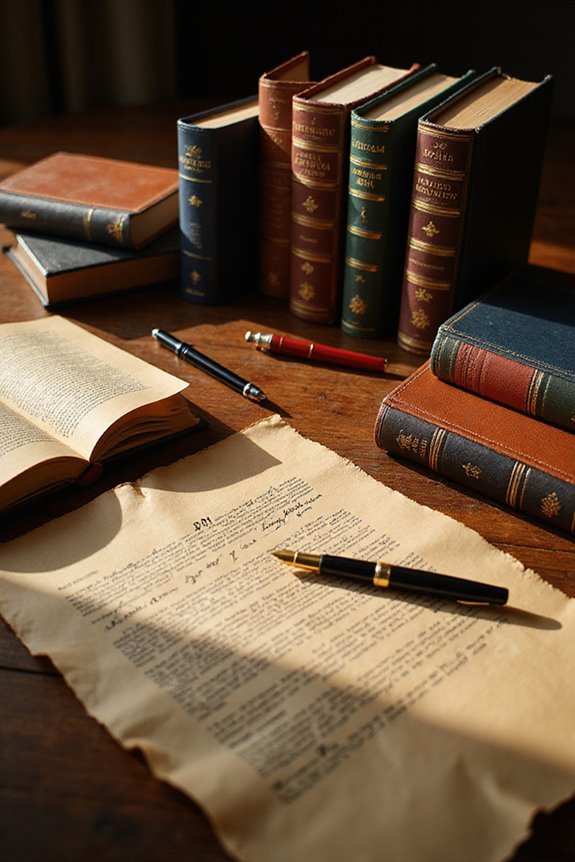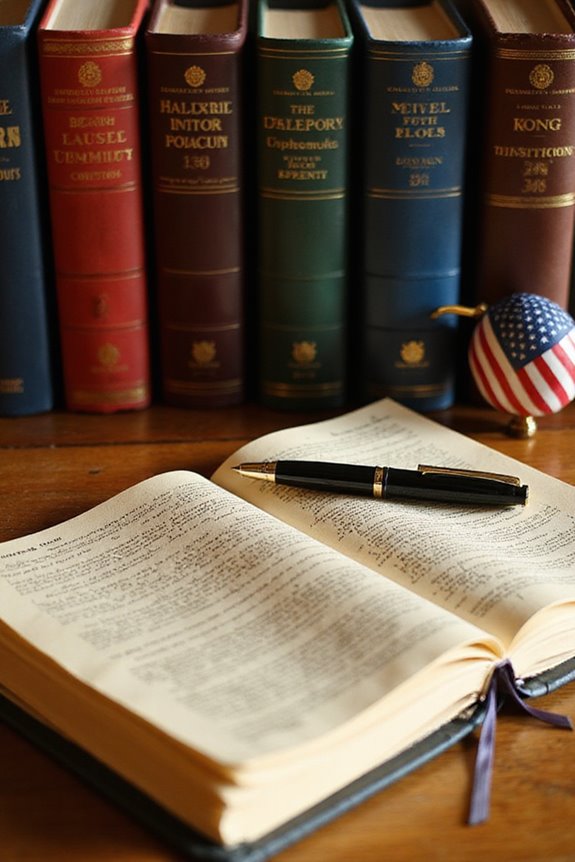To explore the best political fiction books, we can consider a blend of classic and contemporary titles that examine governance and ethics:
- *The Prince* by Machiavelli emphasizes power dynamics.
- *1984* by Orwell critiques authoritarianism through surveillance.
- *All the King’s Men* reveals political ambition’s moral ambiguity.
- *Catch-22* uses satire to expose the absurdities of war.
These titles reflect complex themes and pivotal moments that shape our understanding of political landscapes. More insights are available as we further analyze each category.
Key Takeaways
- *All the King’s Men* explores the moral ambiguity of political ambition and the consequences of corruption in governance.
- *1984* by George Orwell presents a dystopian view of totalitarianism, emphasizing themes of surveillance and the manipulation of truth.
- *Catch-22* by Joseph Heller critiques the absurdities of war and bureaucracy through dark humor and satire.
- *The Handmaid’s Tale* by Margaret Atwood addresses themes of gender oppression and authoritarianism in a theocratic society.
- *Animal Farm* serves as an allegory for the corrupting nature of power, critiquing totalitarian regimes through a satirical lens.
Classic Political Novels
When we explore classic political novels, we find a rich tapestry of narratives that examine power dynamics and moral complexities. These works often feature nuanced character development, showcasing individuals who navigate the murky waters of political life.
- *The Prince* by Machiavelli introduces the idea that leaders might prioritize power over morality, raising questions about ethical governance. This notion resonates with the historical context of political philosophy, as it reflects the ongoing debate about the relationship between ethics and authority.
- In Leviathan, Hobbes presents a bleak view of human nature, advocating for strong authority to prevent chaos.
- *The Republic* by Plato investigates justice and the ideal state, influencing political thought.
- *All the King’s Men* illustrates the moral ambiguity of political ambition through its portrayal of corruption.
These classic novels remain pivotal in understanding the intricate relationship between power and ethics, as they are part of a comprehensive collection of the greatest political books, showcasing the profound impact of political literature.
Modern and Contemporary Political Fiction

Modern and contemporary political fiction offers an essential lens through which we can examine today’s complex political landscape. This genre reflects global unrest and explores systemic injustice, often highlighting identity struggles faced by marginalized communities.
- Diverse perspectives are integral, showcasing experiences related to race, gender, and immigration. These narratives can deepen our understanding of governance challenges and how they affect various groups.
- Authors tackle moral dilemmas and personal ambitions, illustrating the impacts of politics on individual lives. Political satire is employed to critique authoritarianism, exposing the absurdities of power dynamics.
Notable titles, like The Ministry of Utmost Happiness and *The Chronicles*, engage with pressing issues, from climate change to the rise of conspiracy theories. Through these narratives, we gain insights into the moral complexities and challenges of contemporary governance, further emphasizing how political fiction serves as a lens for examining power dynamics and resistance.
Political Thrillers
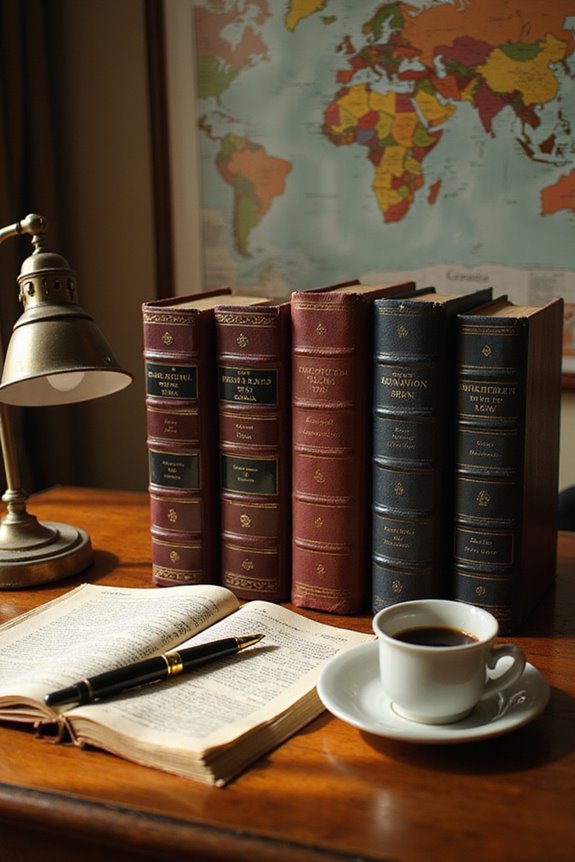
Political thrillers captivate readers by weaving intricate plots that explore the murky waters of espionage, terrorism, and political intrigue. These narratives often investigate the darker aspects of political manipulation, showcasing how power can corrupt individuals and institutions.
Key elements include:
- Espionage tactics: Characters frequently navigate a landscape filled with double agents and covert operations, as seen in *The Spy Who Came in from the Cold*. This novel is renowned for its psychological depth that adds complexity to the characters’ motivations and actions. Additionally, many political thrillers reflect themes from historical political theories, enriching their narratives with real-world implications.
- Political manipulation: Works like *The Manchurian Candidate* illustrate how ideologies can be twisted for personal or state gain.
- Tension and suspense: Titles such as *Blowback* and *The Hunt for Red October* highlight the urgency of counterterrorism and military strategy.
Books on Political Philosophy and Leadership
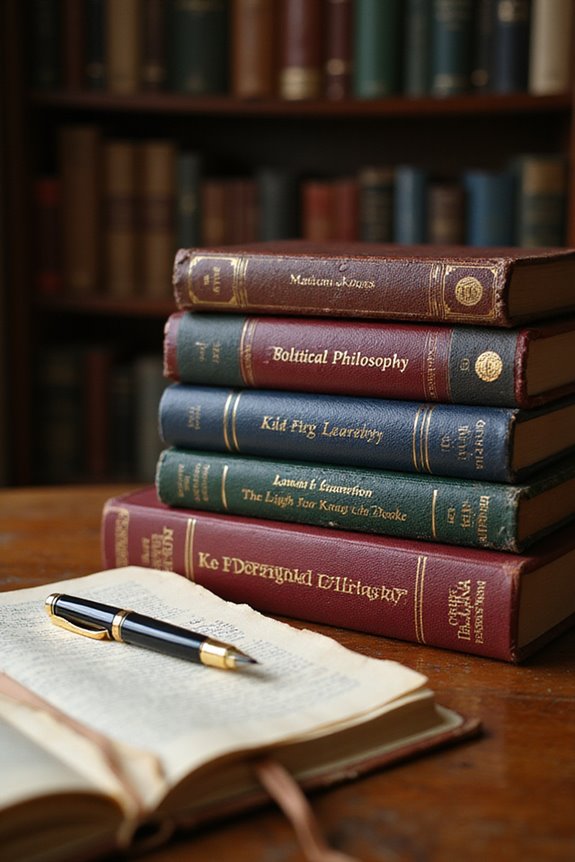
Books on political philosophy and leadership provide critical insights into the principles that govern societies and the dynamics of power. They explore philosophical foundations that shape thought and practice. Key texts include:
- *The Republic* by Plato, advocating for philosopher kings.
- *Leviathan* by Hobbes, discussing social contracts.
- *Justice: What’s the Right Thing to Do?* by Sandel, examining justice and moral reasoning. These works often highlight marginalized voices that challenge conventional narratives.
In terms of leadership strategies, we find:
- *The Prince* by Machiavelli, a guide on power maintenance.
- *The Art of War* by Sun Tzu, offering strategic principles.
- *The Audacity of Hope* by Obama, blending philosophy with practical insights. Reading these influential texts fosters effective leadership by providing timeless lessons and strategies for navigating complex political landscapes.
These works collectively deepen our understanding of political structures and effective leadership in various contexts.
American Political Power and Insider Stories
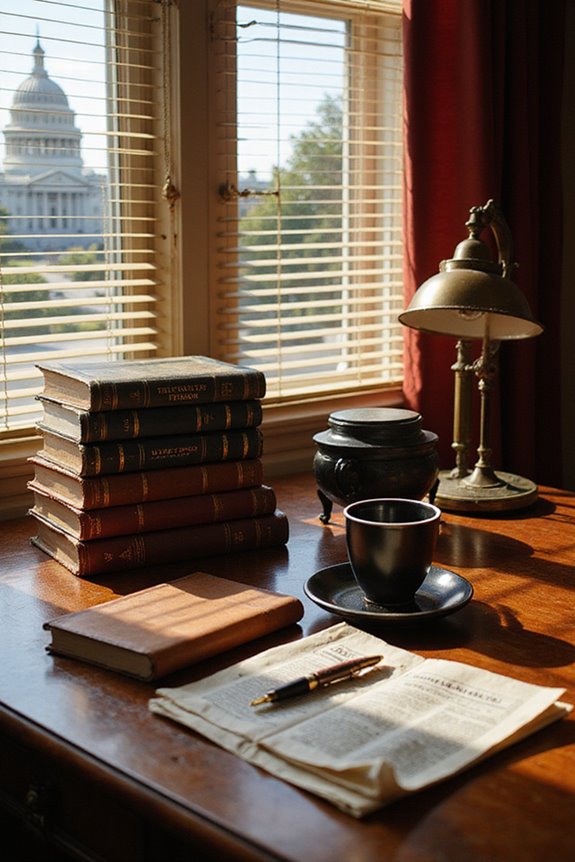
The intricate workings of American political power are vividly captured in fiction, offering readers an insider’s view of the dynamics at play within the White House and Congress. These insider narratives explore the tensions of presidential decision-making during crises and illustrate the complex relationships between the president, cabinet, and Congress.
Key themes include:
- The influence of the Electoral College on presidential legitimacy and policy direction.
- The portrayal of legislative negotiations, vetoes, and the intricate processes shaping lawmaking.
- Insights into Senate filibusters, committee battles, and partisan conflicts affecting legislation.
- The role of lobbying and political bargaining in shaping congressional outcomes.
- The impact of electoral dynamics on party strategies and voter mobilization. State governments possess inherent powers that can lead to unique political scenarios depicted in these narratives. Additionally, these stories often highlight the moral dilemmas and corruption themes that reflect on the reality of political life.
These narratives provide a deeper understanding of American political power.
Novels Exploring Ideology and Social Change
Exploring ideology and social change through novels offers us a unique lens into the transformative power of literature.
- The Possessed by Fyodor Dostoevsky reveals how radical ideologies can disrupt a community, showcasing the chaos born from extremist beliefs.
- In Americanah, Chimamanda Ngozi Adichie connects personal experiences with broader societal issues, addressing race, migration, and identity.
- The Nickel Boys by Colson Whitehead uncovers systemic injustice and its impact on marginalized groups, highlighting the urgent call for social justice.
- The Ministry of Utmost Happiness by Arundhati Roy illustrates activism and identity amidst political unrest in India.
These novels provide critical insights into how literature reflects and influences ideology and social change, inviting us to contemplate their implications in our own lives. Additionally, they echo the themes found in activism literature, illustrating how storytelling can inspire and inform activism efforts.
Dystopian Political Fiction
Dystopian political fiction provides a compelling examination of authoritarianism, where oppressive regimes reveal the darker aspects of governance. These dystopian narratives often illustrate the consequences of totalitarianism, incorporating themes of surveillance, thought control, and societal hierarchies.
- Classic Works:
- *1984* by George Orwell showcases manipulation of truth and pervasive surveillance.
- *The Handmaid’s Tale* by Margaret Atwood highlights gender oppression under a theocratic regime.
- Modern Perspectives:
- *Leila* by Prayaag Akbar presents religious segregation in a future India.
- *Kaharlyk* by Oleh Shynkarenko satirizes foreign occupation and mind control in Ukraine.
Such narratives reflect universal concerns about authoritarian governance, urging readers to contemplate the fragility of freedom. In addition, works like *Fahrenheit 451* by Ray Bradbury emphasize the importance of preservation of literature, illustrating the dangers of censorship and the erosion of critical thought.
Biographical Political Fiction
Biographical political fiction serves as a unique lens through which we can examine historical narratives and political dynamics. This genre often blends character development with historical accuracy, allowing us to engage with key figures and events.
- Notable Titles:
- *All The King’s Men*: Chronicles a populist governor’s rise and fall, exploring political ambition.
- *The Charterhouse of Parma*: Depicts an aristocrat’s life amid Napoleonic conflicts, highlighting European politics.
- *Uncle Tom’s Cabin*: Critiques slavery, influencing public opinion pre-Civil War.
- Themes Explored:
- Psychological impacts of political ambition.
- Personal morality versus public actions.
- The intersection of private lives with political decisions.
- Political novels often serve as tools for recording and interpreting history, providing context to the narratives we engage with.
Through these narratives, we gain insights into power dynamics and the complexities of political life, enhancing our understanding of history.
Satirical Political Novels
Satirical political novels provide a critical examination of political systems, societal norms, and human behavior through humor and irony. These works utilize satirical techniques to expose political absurdity and challenge the status quo.
- “Catch-22” by Joseph Heller: Highlights the irrationality of war through bureaucratic absurdities.
- “Animal Farm” by George Orwell: An allegory that critiques totalitarianism and the corrupting nature of power.
- “Candide” by Voltaire: Mocks philosophical optimism while revealing human folly and hypocrisy.
- “The Resistible Rise of Arturo Ui” by Bertolt Brecht: Uses absurdity to illustrate the dangers of fascism and political manipulation.
These novels not only entertain us but also prompt reflection on the complexities of power and societal issues, making them essential reads for understanding our world.
Frequently Asked Questions
What Defines Political Fiction as a Genre?
Imagine a digital town square buzzing with debate; that’s political fiction. It’s defined by character motivations and narrative techniques that critique society, challenge power, and inspire change, blending storytelling with political insight to provoke thought.
How Do Political Novels Reflect Real-World Events?
Political novels often mirror real-world events through historical accuracy and character motivations. They help us understand societal issues, prompting us to reflect on our own beliefs and encouraging deeper engagement with the political landscape around us.
Are There Common Themes in Political Fiction?
Did you know that 75% of people believe fiction can influence opinions on social justice? In political fiction, we often see power dynamics shift, revealing complexities in governance and highlighting struggles for social justice through compelling narratives.
Can Political Fiction Influence Public Opinion or Policy?
We believe political fiction can greatly influence public perception and drive policy change. By engaging readers emotionally, it raises awareness of critical issues, inspiring them to think critically and advocate for necessary societal transformations.
What Makes a Political Novel Timeless or Relevant?
Timeless political novels captivate us through rich character development and innovative narrative styles. They resonate by intertwining universal themes with personal stories, prompting reflection on societal issues and challenging our beliefs long after their publication.

